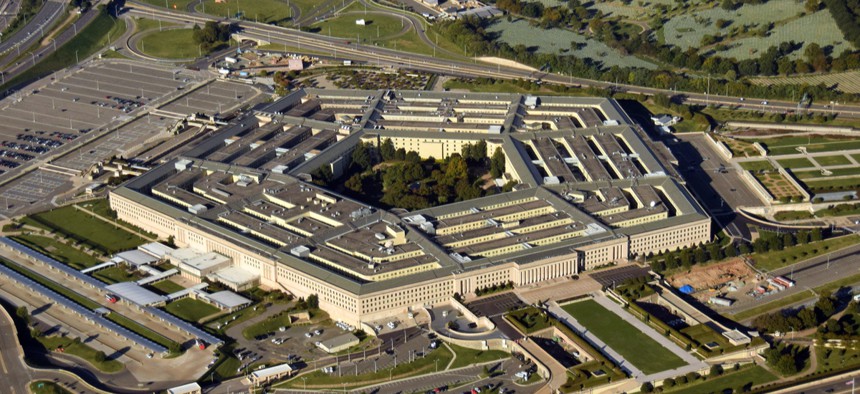Court Rules in Favor of Pentagon in JEDI Lawsuit

Ivan Cholakov/Shutterstock.com
The ruling against Oracle clears the way for the government to award the contract in August to Microsoft or Amazon Web Services.
The Defense Department has triumphed in the eight-month-long U.S. Court of Federal Claims lawsuit filed by Oracle over its $10 billion Joint Enterprise Defense Infrastructure contract.
On Friday, Senior Judge Eric Bruggink ruled in favor the Defense Department—and Amazon Web Services, which joined the lawsuit as an intervener—stating that Oracle could not meet certain gate criteria when bids were due in late 2018.
The judge’s order also denied numerous allegations made by Oracle over the course of several months, including an alleged conflict of interest between AWS and Defense Department officials.
“Because the court finds that [gate criteria] is enforceable, and Oracle concedes that it could not meet that criteria at the time of proposal submission, we conclude that it cannot demonstrate prejudice as a result of other possible errors in the procurement process,” Bruggink’s order states. “We conclude as well that the contracting officer’s findings that an organizational conflict of interest does not exist and that individual conflicts of interest did not impact the procurement were not arbitrary, capricious, an abuse of discretion, or otherwise not in accordance with law”.
The decision comes 18 months into the competition for JEDI among several large tech companies that included influence campaigns, a dossier full of allegations of impropriety on AWS’ behalf and three bid protests.
Last month, the Pentagon’s top tech official, Dana Deasy, told reporters the Defense Department planned to award JEDI in August to either Microsoft or AWS. Bids from other competitors, IBM and Oracle, did not make the final cut. AWS remains the only commercial cloud provider that meets the government’s stringent standards to host, store and analyze classified secret and top secret data.
JEDI will be a commercially built and operated cloud to host battlefield, tactical and classified data to be analyzed and used to increase the lethality and connectivity of warfighters at the tactical edge. The Pentagon first came up with the concept for JEDI in late 2017 and the project is the centerpiece of the department’s cloud strategy.
Former Defense Digital Service director Chris Lynch, who oversaw the JEDI procurement for a time, responded to the decision in a tweet.
“We did it the right way from the very start with an amazing team,” Lynch said. “JEDI will immediately deliver much needed capabilities to the warfighter, deliver incredible capabilities that are built from the best tech, and it will change lives. Couldn't be more proud.”
AWS, in a statement, said it “stands ready to support and serve” the Defense Department.
“The DoD deserves access to the best technology in the world and we are unwavering in our support to their mission,” an AWS spokesperson said.
Oracle could appeal the decision to the U.S. Court of Appeals for the Federal Circuit. When reached for comment, Oracle did not say whether it would appeal.
“Oracle’s cloud infrastructure 2.0 provides significant performance and security capabilities over legacy cloud providers. We look forward to working with the Department of Defense, the Intelligence Community, and other public sector agencies to deploy modern, secure hyperscale cloud solutions that meet their needs,” the company said in a statement to Nextgov.
The Defense Department said it was "pleased" with the court's decision in a statement Friday.
"This reaffirms the DOD's position: the JEDI Cloud procurement process has been conducted as a fair, full and open competition, which the contracting officer and her team executed in compliance with the law," said Pentagon spokeswoman Elissa Smith. "DOD has an urgent need to get these critical capabilities in place to support the warfighter and we have multiple military services and Combatant Commands waiting on the availability of JEDI. Our focus continues to be on finalizing the award decision."
Before Oracle filed its lawsuit with the Court of Federal Claims, the company and rival IBM both filed bid protests with the Government Accountability Office. Oracle’s protest was denied, while IBM’s protest was dismissed due to the U.S. Court of Federal Claims handling Oracle’s ongoing lawsuit.
Historically, appeals to U.S. Court of Federal Claims decisions are rare in government contracting cases. Three years ago, data analytics firm Palantir successfully sued the Army over its Distributed Common Ground System procurement, ultimately prevailing after losing its initial bid protest with the Government Accountability Office.
The court is expected to release a full opinion in the coming days.
While the decision allows the Pentagon to continue toward an August award date for JEDI, Congress has become increasingly involved in the contract.
Last year, Congress exercised its oversight authority on JEDI, forcing the Pentagon to justify its plan to award JEDI to a single cloud provider. The Pentagon complied and released a subsequent cloud strategy that explained JEDI will be just one of many clouds the military apparatus plans to incorporate.
Recently, a string of Republicans have called for holds on funding to JEDI or additional scrutiny. In a June appearance on Tucker Carlson’s show on Fox, influential Republican Rep. Mark Meadows called the Amazon allegations “incredible” and called for an investigation. Republican Sen. Ron Johnson, who chairs the Senate’s Homeland Security Committee, asked acting Defense Secretary Mark Esper in a late June letter to hold off on awarding JEDI until an investigation is completed. According to the Associated Press, Sen. Chuck Grassley, R-Iowa, said JEDI’s bidding process should be restarted.
On Thursday, Sen. Marco Rubio, R-Fla., asked National Security Advisor John Bolton in a letter to delay the contract due to concerns over bias toward Amazon, according to The Hill.
NEXT STORY: DOD prevails in JEDI case; award can proceed






